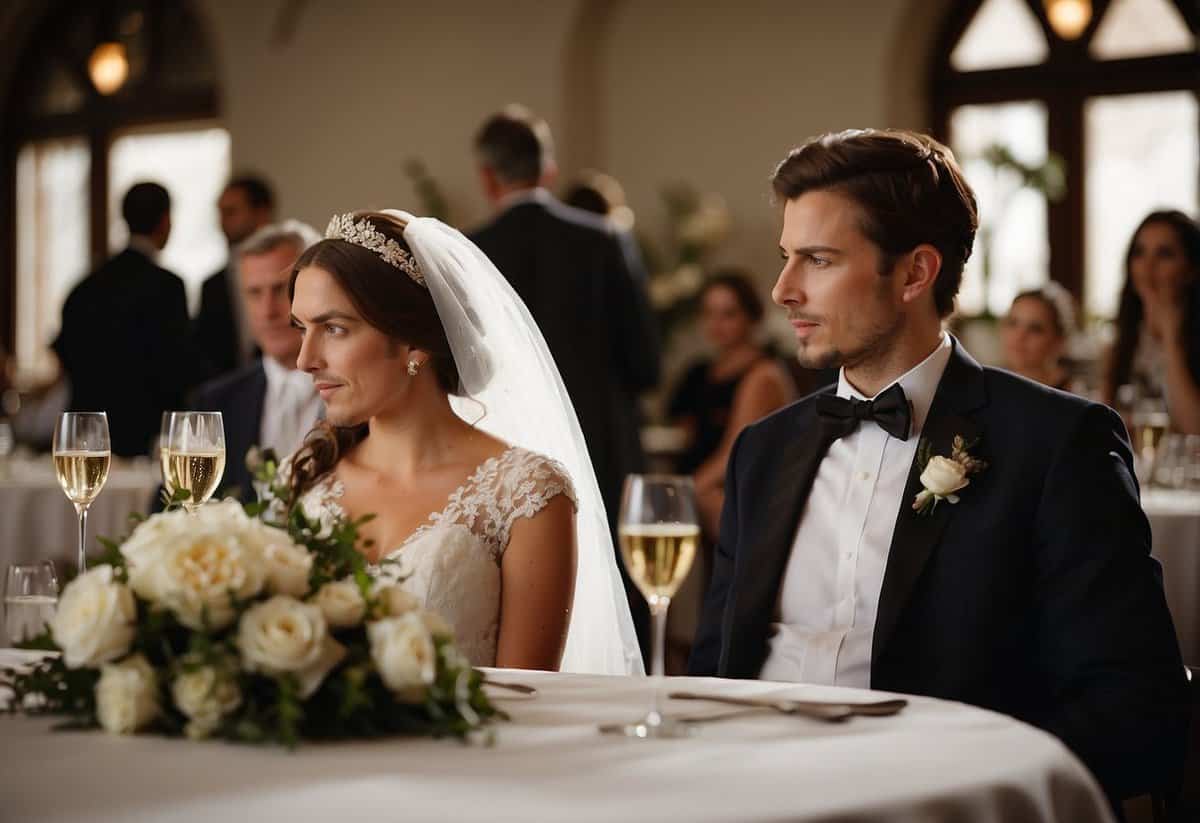Is It Normal to Feel Disappointed After Your Wedding? Exploring Post-Wedding Blues
Feeling a wave of different emotions after your wedding is completely normal. You might have spent months or even years planning your big day, so it’s only natural to feel a bit low when it’s all over. Yes, it is perfectly normal to feel disappointed after your wedding.

Weddings are often filled with excitement, anticipation, and joy. Once the celebrations end, you may experience a drop in those intense emotions, leading to feelings of sadness or disappointment. Many newlyweds feel this way, and it’s a common part of the transition from the wedding festivities to everyday life.
You’re not alone if you worry about the post-wedding blues. It’s important to acknowledge that these feelings are valid and normal. If you give yourself time and space to process, you’ll find yourself adjusting to this new chapter of your life. For more insights on navigating these emotions, check out this helpful guide from WeddingWire.
Understanding Post-Wedding Emotions

After your wedding, you might feel a mix of highs and lows. It’s important to understand why these feelings arise and how they can affect you and your new marriage.
Navigating the Rollercoaster of Feelings
You may have been on an emotional high during your wedding. Planning and celebrating can bring excitement and joy. Once it’s over, you might feel a sudden drop.
This can lead to what many call the post-wedding blues. Feeling sadness, nostalgia, or even anxiety is common. You invested time, energy, and emotions into this big day. When it’s over, you might miss the buzz and anticipation.
Relief can also set in. With all the planning done, some may feel a sense of calm. You might find your daily routine lacking the thrill it had before. This mix can make adjusting to your new life with your partner challenging.
The Science of Post-Wedding Blues
Your brain chemistry plays a big role in post-wedding emotions. During the build-up to the wedding, your body releases more dopamine, the “feel good” hormone. This boost in excitement can leave you feeling a void once the event is over.
Additionally, the sudden focus shift can be jarring. Before, every detail was about your special day. Now, it’s back to normal life. This can lead to feelings of sadness or even mild depression.
Marriage itself adds new dynamics. You might worry about finances, adapt to living together, or just miss the thrill of planning. This can cause anxiety, which is normal as you navigate this new chapter.
Adjusting to married life might take time. Knowing these feelings are common can help you manage them. Embracing this transition with open communication with your partner is key.
Using these insights, you can better prepare for and understand the emotional shifts that follow your wedding.
Acknowledging the Imperfections

It’s common to feel disappointed after your wedding, and a big part of moving forward is acknowledging imperfections. You need to accept what went wrong and deal with family expectations to find peace.
Accepting What Went Wrong
Every wedding has its flaws. Maybe the cake didn’t taste as expected or the weather didn’t cooperate. These mishaps can leave you feeling upset. Remember, your wedding day, like any other day, can be imperfect.
To cope, focus on the positive moments. Write down memories that made you smile. Share funny stories with your partner. Talking about what went wrong helps you realize that imperfections don’t define your wedding.
You can also look at how these imperfections make your wedding unique. Small mishaps can become cherished stories. Accepting what went wrong doesn’t mean ignoring it. Instead, it’s about understanding these moments as part of your journey.
Dealing With Family Expectations
Family expectations can add pressure to your wedding day. You may feel guilty if you think you didn’t meet those expectations. Maybe a relative didn’t like the venue, or there were disagreements about the guest list. These issues can weigh heavily on you.
To ease the burden, talk openly with your family. Explain how you feel and listen to their views. Creating a dialogue helps clear misunderstandings. It’s important for them to know your wedding was planned with love and care.
If family expectations are causing guilt, remember that this day was about you and your partner. It’s okay if everything wasn’t perfect. Setting boundaries can help manage these expectations in the future. Be kind to yourself and understand that it’s normal to face such challenges.
Life After the Wedding Day

As you transition from the excitement of your wedding day to the routine of everyday life, it’s normal to feel a mix of emotions. Adjusting to married life and combating any feelings of boredom or letdown can help you find joy and satisfaction in this new chapter.
Transitioning to Married Life
Starting married life can be both exciting and challenging. You’ll likely notice changes in your everyday life as you adjust to your new roles and responsibilities. Communication is key. Talk openly with your spouse about your feelings, expectations, and any concerns you might have.
Create new routines: Establish daily or weekly habits that you both enjoy, like a weekend walk or cooking dinner together. This helps build a sense of partnership.
Share responsibilities: Decide how to divide chores and finances. Being clear about these tasks can prevent misunderstandings and reduce stress.
Plan for the future: Set goals together, whether it’s saving for a vacation or planning a family. Having shared objectives strengthens your bond.
Combatting Boredom and Letdown
The excitement of planning a wedding can leave a void once it’s over. It’s common to feel some boredom or a sense of letdown after the big day.
Stay active: Find hobbies or activities you enjoy doing together. This could be anything from hiking to joining a book club. Staying busy keeps your mind engaged and helps prevent boredom.
Maintain social connections: Keep in touch with friends and family. Socializing is crucial for emotional health and can prevent feelings of isolation.
Practice gratitude: Start a gratitude journal where you both write down things you’re thankful for. This practice helps you stay positive and appreciate the little things in everyday life.
Seek new adventures: Plan new experiences, like a short trip or a date night at a new restaurant. Exploring together keeps your relationship fresh and exciting.
Communication and Moving Forward

Feeling disappointed after your wedding is common, but clear communication and practical strategies can help you and your spouse navigate these feelings and move forward.
The Role of Communication in Marriage
Healthy communication is a vital part of any marriage. When you talk openly with your spouse about your feelings, it strengthens your bond and builds trust.
If you’re feeling disappointed after your wedding, share these emotions with your partner. This can help prevent misunderstandings and ensure you both are on the same page.
Listening is just as important as talking. Make sure to listen actively to your partner’s concerns and emotions. Use “I” statements, like “I feel” instead of “You make me feel,” to express personal emotions without blaming.
Regular check-ins can also be beneficial. Schedule a time each week to discuss how both of you are feeling and any concerns. This consistent communication can provide support and understanding on a regular basis.
Strategies to Move On
Moving on from post-wedding disappointment involves focusing on positive actions and goals. One effective strategy is to practice gratitude.
Keep a gratitude journal where you both write down things you’re thankful for. This can help shift your focus from what’s missing to what’s present and good in your life.
Set new goals together as a couple. Whether it’s planning a trip, starting a new hobby, or working on a joint project, having something to look forward to can elevate your mood and strengthen your relationship.
Lean on your support network. Talk to friends or family who can offer advice and encouragement. Sometimes, an outside perspective can be very helpful.
Lastly, take care of yourselves individually. Self-care activities such as exercise, hobbies, and relaxation techniques can reduce stress and improve your overall well-being.
Reviving the Joy

Feeling disappointed after your wedding is normal, but there are ways to bring back the joy and excitement in your life. Focus on creating new experiences and planning for the future to combat the post-wedding blues.
Creating New Excitement
One way to lift your spirits is by embarking on new adventures together. This could be as simple as trying a new hobby or as grand as planning weekend getaways. Engaging in activities you both enjoy can reignite the excitement.
Consider setting small goals for yourselves, whether it’s redecorating a room in your new home or taking a cooking class. These shared experiences create new memories that strengthen your bond and help alleviate feelings of post-wedding depression.
Another fun idea is starting a gratitude journal together. Write down things you are thankful for in your marriage. This practice is shown to increase happiness and keep you focused on the positive aspects of your new life.
Planning for the Honeymoon and Beyond
Even if you’ve already had your honeymoon, planning future trips can give you something to look forward to. Discuss destinations you’d love to visit and start saving or planning for them. It doesn’t have to be a grand vacation; even a short trip can bring joy.
Think about your long-term goals too. Discuss your plans for the next few years and set objectives together. Maybe you want to start a family, buy a house, or take up new hobbies together. These plans provide direction and shared purpose.
Creating a list of wedding ideas you didn’t have time to implement or things you’d like to do differently for your anniversary can also be exciting. It keeps the positive energy from your wedding alive and helps you stay connected.



